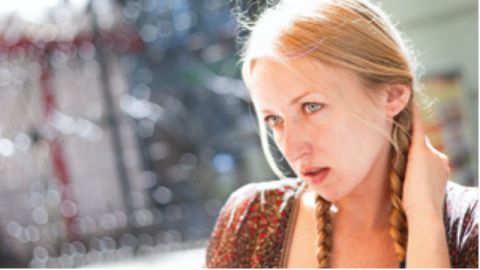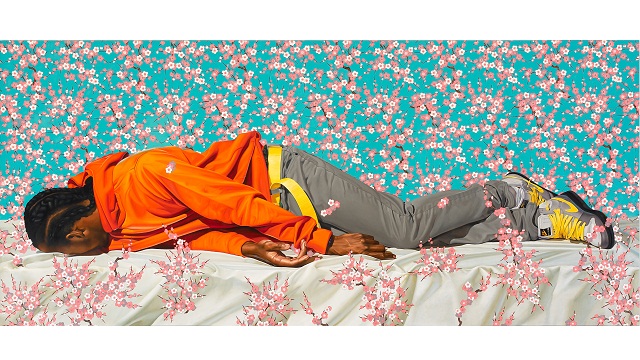What You Give, You Will Get Back

“Bread. Kasha. Sometimes fish. Water.” Those are the things that Maryna Vroda, winner of the Palme d’Or at the Cannes Film Festival last year for the best short film, lists off as her regular diet in Kyiv, Ukraine, where she lives in a small flat. “Sometimes money comes to my life,” she says. “I don’t think too much from where it comes.” Her preferred sustenance, she says, is working with energy.
“Art is not free. What you give, you will get back,” she says of the creative process. At 30-years-old, Vroda’s style is mature, filled with a commanding voice and ethereal beauty. In Rain, she turns a storm into a third character dividing an elderly couple—a cursing man searching for his babushka lost in a drenched field. The rain charges their rural farmhouse, swatting around metal cups and chasing the dog into his doghouse. A former law student and the daughter of engineers, Vroda helped build the necessary rain machine; but with her film’s transportive quality one would think she has the power to lasso heavy clouds.
In contrast, her Cannes-winner Cross shows teenage angst one sunny day in a cheery rural lake setting bursting with “schools out for summer” scenarios. There’s the pregnant Ukrainian “Snookies” rocking their baby carriages, the boys getting into fights to show off in front of the girls, and other dangerous encounters throughout this summery afternoon of longing. Co-produced with France, Cross’s existence is surprising, let alone that it was selected by a jury headed by Michel Gondry, director of Eternal Sunshine of the Spotless Mind, to receive a coveted scroll.
A few years ago, Vroda was discovered, through mutual acquaintances, in Kyiv by someone with connections to France’s Ministry of Culture who then shepherded her film into a production deal. But until then, she worked alone with her small Ukrainian film crew, convinced that as long as she created the energy she wanted everything she needed for her project would come to her. “I did not think too much before. Make something, and it will come,” she says. “I believe that.”
In a developing country struggling with bandit capitalism and violent political corruption out of Putin’s playbook, Ukraine does not offer hand-outs to young artists trying to develop their craft. Their talents are presumably better spent on mere survival. That’s why Vroda, for years, initially studied to become a lawyer. “Being an artist is for the rich,” she says. Her parents must keep working to supplement their $150 a month pension, and needless to say they did not approve of her decision to pursue filmmaking.
“I decided not to think about my family,” she says. “It’s painful that I did not decide to be something that would bring more money. (But) I cannot do (it) another way. My parents are retired, but they’re still working extremely hard.” Now, she says, her family is proud of her and understands her decision; they were in the south of France to be with her on the red carpet.
“Sometimes when you choose something unnatural for you, you will lose your sensibility,” she says about the conviction that kept her grounded and working by herself in her little room, with a Cannes win far beyond her wildest dreams. She’s committed to filmmaking despite the likely future possibilities of failure she’s quick to point out. She instead plans to focus on continuing to lose herself in nature. “First of all, it’s work with energy, with time, with something immaterial before (the idea) will come,” she says, citing the mountains and sea as inspiration. “I am human. I have a short time to live, but when I’m living I’m in connection with something bigger [that] never will die. The most difficult work is before, before you have (an) idea, when you know nothing. This moment, I think, it’s the most beautiful in life.”
Facing down the blank canvass is where she begins to feel reborn. “I should be absolutely lonely,” she says. “You feel something. You don’t exist. Then you are born from something new. Each time, it is painful and happy at the same time. You transform, grow up, because to make a film or to make anything, you should make a decision. To make this decision, it must be just from you.”
Vroda believes that artists never truly work alone. There’s always someone to watch the film, to read the book who will then collaborate just through thoughts of their own.
These ideas were not taught to her during her five years of film school at Karpenko-Karyy, or Kyiv’s National University of Theatre, Cinematography and Television. In fact, Vroda doesn’t recommend film school as a path to becoming a director, though she says she found it useful. Instead, she advises giving your project all the energy you want to come back to you.
“Don’t think about the success too much,” she warns. “Be ready to be patient, to know that it will never work. On each festival you will lose something, because this is the way. Life is never in pink colors. It’s not just happiness. Sometimes it doesn’t work, and it may not work.”
But then sometimes, you might find yourself discussing directing with Michel Gondry in Cannes.
Photo Credit: Andriy Lomakin/Ukraine Week





